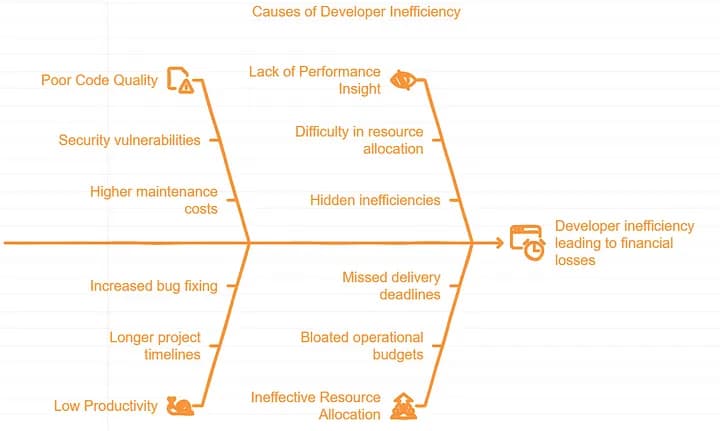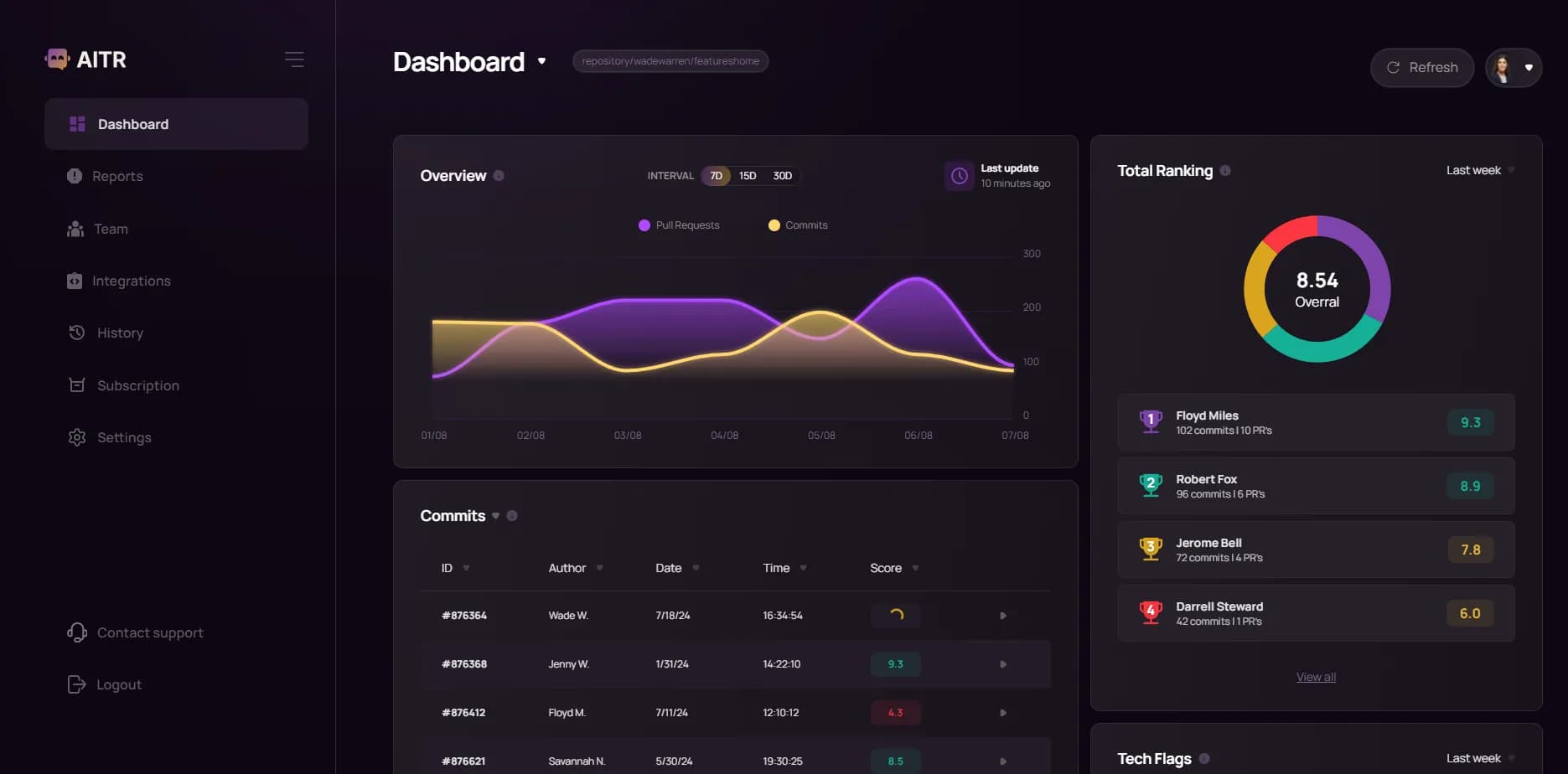Reducing Operational Costs in Tech Companies with AITR
In today’s fast-paced tech environment, inefficiency in development teams and substandard code quality can significantly inflate operational costs for companies. Managing developers effectively and ensuring high-quality outputs are two challenges that often lead to wasted resources, missed deadlines, and increased overhead. These issues not only slow down project timelines but also create a ripple effect across various departments. AITR platform addresses this issue by offering a comprehensive solution designed to streamline operations and enhance the performance of development teams.
The Cost of Developer Inefficiency
When developers produce poor-quality code or when their productivity levels drop, the impact on a company’s bottom line can be substantial. Low-efficiency rates among developers lead to longer project timelines, increased bug fixing, and, in extreme cases, missed delivery deadlines. Companies find themselves paying more in terms of man-hours while getting less value in return. Worse yet, poor code quality often results in security vulnerabilities, system downtime, and higher maintenance costs.
Additionally, when managers lack detailed insight into their teams’ performance, they struggle to allocate resources optimally. Without the ability to accurately gauge how individual developers are contributing to project progress, inefficiencies remain hidden, leading to bloated operational budgets. The lack of transparency creates a disconnect between what is planned and what is actually being delivered.

How AITR Addresses These Challenges
AITR steps in as a powerful tool designed to resolve these issues. By providing detailed reports on developer activities, AITR delivers real-time insights into performance, output quality, and time allocation. This transparency enables managers to make data-driven decisions that directly lead to cost savings.
Performance Tracking and Accountability AITR offers detailed reports on pull requests, commits, and project involvement, giving managers a bird’s-eye view of each developer’s contributions. By quantifying developer output, AITR enables managers to identify underperforming team members and areas where performance can be improved. This feature alone can significantly reduce wasted resources by ensuring that tasks are aligned with the right skill sets.
Improving Code Quality One of the major contributors to increased operational costs is the poor quality of code. AITR’s AI-powered analysis detects code issues early in the development cycle, ensuring that bugs and security flaws are addressed before they become more expensive to fix. By catching these problems upfront, companies save on costly revisions and avoid downtime due to faulty code in production environments.
Time and Resource Management Another area where AITR shines is in optimizing time and resource allocation. By measuring the time developers spend on specific tasks, managers can better understand workload distribution and adjust project timelines accordingly. This feature ensures that high-priority tasks receive the attention they deserve, preventing bottlenecks and unnecessary delays. Ultimately, better time management translates to lower operational costs.

Enhancing Developer Productivity
AITR doesn’t just help managers — it also boosts developer productivity directly. Through the use of detailed feedback loops and performance metrics, developers can see where they stand in comparison to their peers and where they need to improve. By fostering a culture of accountability, AITR motivates developers to maintain high standards and consistently produce high-quality work.
Real-Time Feedback The platform’s real-time feedback system keeps developers informed about the quality and security of their code, helping them make immediate improvements. This iterative feedback reduces the number of code revisions needed, cutting down on overall development time and enhancing productivity.
Tech Flags for Security and Quality AITR’s integrated “Tech Flags” are designed to highlight potential security risks and code quality issues, ensuring that developers work within safe parameters. This feature minimizes the risk of deploying vulnerable code, reducing the potential for costly security breaches that could halt operations.
Streamlined Communication and Collaboration
One often-overlooked factor in operational inefficiency is poor communication between developers and management. AITR bridges this gap by providing clear, data-driven insights that are accessible to both technical and non-technical stakeholders. Automated reports and messaging app integrations keep everyone informed, minimizing the need for time-consuming meetings and manual status updates.
The ability to generate PDF reports with comprehensive overviews of developer performance ensures that project managers and senior leaders have a clear understanding of project progress without getting bogged down in technical details. This transparency facilitates better decision-making, helping businesses to stay on budget and on schedule.
Conclusion: AITR as a service for cost reduction
By addressing the inefficiencies and quality issues that plague development teams, AITR proves to be a critical tool for reducing operational costs in tech companies. Its combination of detailed performance tracking, real-time feedback, and proactive code analysis allows managers to optimize resources, enhance developer output, and ensure that projects are delivered on time and within budget. For companies struggling with inflated operational expenses due to inefficient teams and subpar code, AITR offers a clear path to improved performance and cost savings.
While the initial investment in such a platform may seem substantial, the long-term savings — both in terms of time and money — make AITR an essential part of any forward-thinking tech company’s toolkit.
